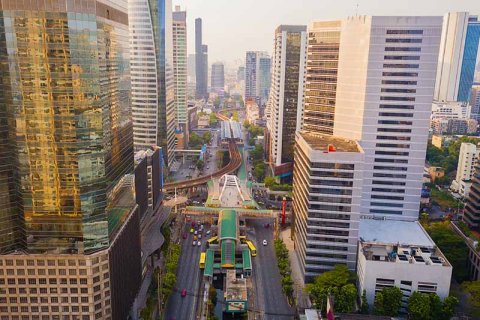
In 2023, you do not need to purchase real estate in Thailand or get a job in a local organization to get a long-term visa. Foreign citizens working remotely in international companies are a separate category that can obtain an LTR (long-term resident) visa. It is not sufficient to conclude an employment agreement to get a permit in the country. In this case, you also need to confirm your professional experience. There are other conditions.
Content:
- Who are digital Nomads?
- What should a digital nomad pay attention to when choosing a place to live?
- Why is the Kingdom of Thailand a great place for a digital nomad?
- What places in Thailand are the most sought-after among digital nomads?
- Long-term Thai visa conditions for a digital nomad
Who are digital Nomads?
Digital nomads are people who work remotely without visiting an office and are not tied to their place of residence, so they change it from time to time and move from country to country.

What should a digital nomad pay attention to when choosing a place to live?
There are several factors that digital nomads focus on when choosing a place to live:
- It is better to think about moving to a city where people speak your native language well or speak English.
- Although most digital nomads have sufficient savings and can travel, they should choose a place where the cost of living will not exceed their income. It is better to put off part of their earnings for the future or the next move.
- It is great if the first place to live is a community of digital nomads. Like-minded people can give you some advice and share their life hacks in a new country.
- You will need a stable Internet connection to work remotely and live wherever you want, for example, in villas in Thailand. Therefore, when choosing a new place to stay, you need to make sure that everything is fine with the Internet.
Why is the Kingdom of Thailand a great place for a digital nomad?
Southeast Asian countries are an excellent choice for an inexpensive stay.
Digital nomads with extensive work experience point to several reasons why they prefer Thailand:
- There are many stunning beaches in the country.
- The local nature is incredibly beautiful.
- The weather is great.
- The cost of living is quite affordable.
- There are many cafes and restaurants where they sell very tasty food.
- Wi-Fi is perfect everywhere, from islands to jungle-covered mountains, which is essential for remote workers.

What places in Thailand are the most sought-after among digital nomads?
Phuket and Chiang Mai are favourite destinations for remote employees and freelancers. Digital nomads appreciate the beauty of these places and the relatively low cost of living.
Remote staff can rent apartments in Thailand, for example, on the island of Phuket, at the following prices:
- An 84 m2 two-bedroom apartment for $1,650;
- A 43 m2 one-bedroom condominium for $870;
- An 880 m2 three-bedroom house for $1,750;
- An 823 m2 six-bedroom villa for $38,000.
Here are some examples of housing for rent in Chiang Mai:
- A 34 m2 one-bedroom condominium for $280;
- A 32 m2 studio for $320;
- A 71 m2 two-bedroom condominium for $370;
- An 80 m2 two-bedroom house for $350;
- An 80 m2 three-bedroom townhouse for $440.
Long-term Thai visa conditions for a digital nomad
Digital nomads must have an annual income of $80,000 over the past two years to obtain a visa and live in houses in Thailand. If the applicant has earned between $40,000 and $80,000 per year over the past two years, he needs to have a master's degree or intellectual property, otherwise the visa will most likely be refused.
Remote workers and freelancers must provide an employment contract with a Thai or foreign organization and prove their work experience in their professional field for at least 5 years.
In addition, the applicant must get medical insurance, which, if necessary, will cover treatment for at least $50,000. Digital nomads can also open a deposit of at least $100,000 instead of medical insurance. They must open this deposit in a bank in Thailand or another country one year before applying for a visa.



